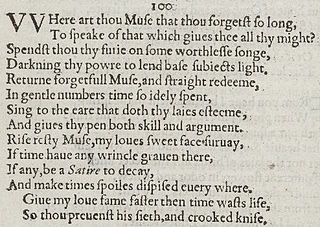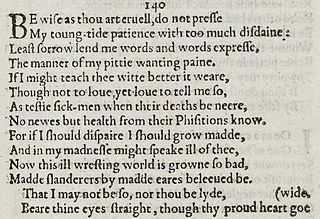
Sonnet 27 is one of 154 sonnets published by William Shakespeare in a quarto titled Shakespeare's Sonnets in 1609. It is a part of the Fair Youth group of sonnets, and the first in a group of five sonnets that portray the poet in solitude and meditating from a distance on the young man. A theme of the first two of the group regards the night and restlessness, which is a motif also found in the sonnets of Petrarch.

Sonnet 39 is one of 154 sonnets written by the English playwright and poet William Shakespeare. It is a member of the Fair Youth sequence, in which the poet expresses his love towards a young man.

Sonnet 100 is one of 154 sonnets written by the English playwright and poet William Shakespeare. It is a member of the Fair Youth sequence, in which the poet expresses his love towards a young man.

Sonnet 63 is one of 154 sonnets published in 1609 by the English playwright and poet William Shakespeare. It is one of the Fair Youth sequence. Contrary to most of the other poems in the Fair Youth sequence, in Sonnets 63 to 68 there is no explicit addressee, and the second person pronoun is not used anywhere in sonnets 63 to 68.

Sonnet 91 is one of 154 sonnets written by the English playwright and poet William Shakespeare. It's a member of the Fair Youth sequence, in which the poet expresses his love towards a young man.

Sonnet 141 is the informal name given to the 141st of William Shakespeare's 154 sonnets. The theme of the sonnet is the discrepancy between the poet's physical senses and wits (intellect) on the one hand and his heart on the other. The "five wits" that are mentioned refer to the mental faculties of common sense, imagination, fantasy, instinct, and memory. The sonnet is one of several in which the poet's heart is infatuated despite what his eyes can see.

Sonnet 74 is one of 154 sonnets published by the English playwright and poet William Shakespeare in 1609. It is one of the Fair Youth sequence.

Sonnet 140 is one of 154 sonnets written by the English playwright and poet William Shakespeare. Sonnet 140 is one of the Dark Lady sonnets, in which the poet writes to a mysterious woman who rivals the Fair Youth for the poet's affection.

Sonnet 76 is one of 154 sonnets published by the English playwright and poet William Shakespeare in 1609. It's a member of the Fair Youth sequence.
Shakespeare's 77th sonnet is the half-way point of the book of 154 sonnets. The poet here presents the idea of the young man taking on the role of poet and writing about himself. This sonnet makes use of the rhetorical device termed correlatio, which involves a listing and correlating of significant objects, and which was perhaps overused in English sonnets. The objects here are a mirror, a time piece and a notebook, each representing a way towards self-improvement for the young man as poet.

Sonnet 80 is one of 154 sonnets published by the English playwright and poet William Shakespeare in 1609. It is part of the Fair Youth sequence, and the third sonnet of the Rival Poet sequence.

Sonnet 81 is one of 154 sonnets written by William Shakespeare, and published in a quarto titled Shakespeare's Sonnets in 1609. It is a part of the Fair Youth series of sonnets, and the fourth sonnet of the Rival Poet series.

Sonnet 82 is one of 154 sonnets published by William Shakespeare in a quarto titled Shakespeare's Sonnets in 1609. It is a part of the Fair Youth series of sonnets, and the fifth sonnet of the Rival Poet group.

Sonnet 83 is one of 154 sonnets published by William Shakespeare in a quarto titled Shakespeare's Sonnets in 1609. It is a part of the Fair Youth group of sonnets, and the sixth sonnet of the Rival Poet group.

Sonnet 84 is one of 154 sonnets published by the English playwright and poet William Shakespeare in 1609. It's part of the Fair Youth sequence, and the seventh sonnet of the Rival Poet group.

Sonnet 85 is one of 154 sonnets published by the English playwright and poet William Shakespeare in 1609. It's part of the Fair Youth sequence, and the eighth sonnet of the Rival Poet group.

Sonnet 86 is one of 154 sonnets first published by the English playwright and poet William Shakespeare in the Quarto of 1609. It is the final poem of the Rival Poet group of the Fair Youth sonnets in which Shakespeare writes about an unnamed young man and a rival poet competing for the youth's favor. Though the exact date of its composition is unknown, it has been suggested that the Rival Poet series may have been written between 1598 and 1600.

Sonnet 95 is one of 154 sonnets written by the English playwright and poet William Shakespeare. It is a member of the Fair Youth sequence, in which the poet expresses his love towards a young man.

Sonnet 96 is one of 154 sonnets written by the English playwright and poet William Shakespeare. It is a member of the Fair Youth sequence.

Sonnet 122 is one of 154 sonnets written by the English playwright and poet William Shakespeare, and first published in 1609. It is a member of the Fair Youth sequence, in which the poet expresses his love towards a young man. Although the relationship started exuberantly in Sonnet 18 by now it has given way to an almost defensive tone. The poet justifies giving away or losing a notebook ("tables") given him by the youth to record shared events by saying that his memories of them are stronger.





















